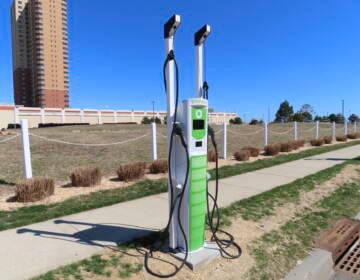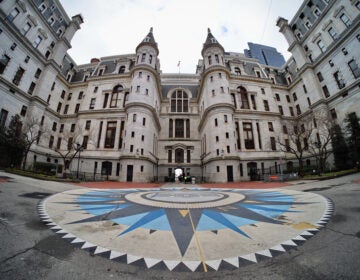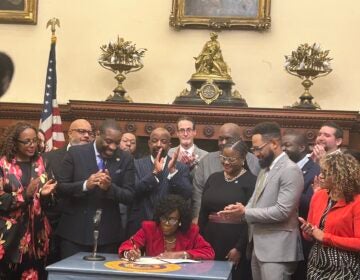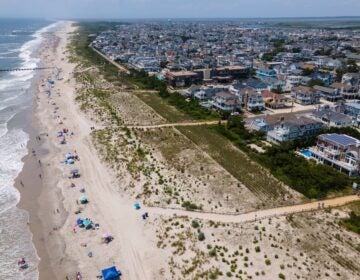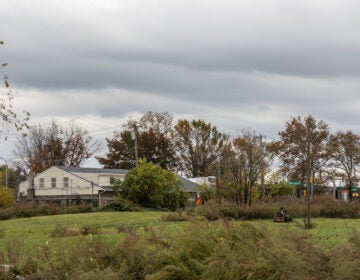New rules aim to boost EV sales as Philly drivers await more charging stations
A federal program to help states install charging stations has met a slow rollout, leaving EV drivers dependent on the available slower chargers.
Listen 2:00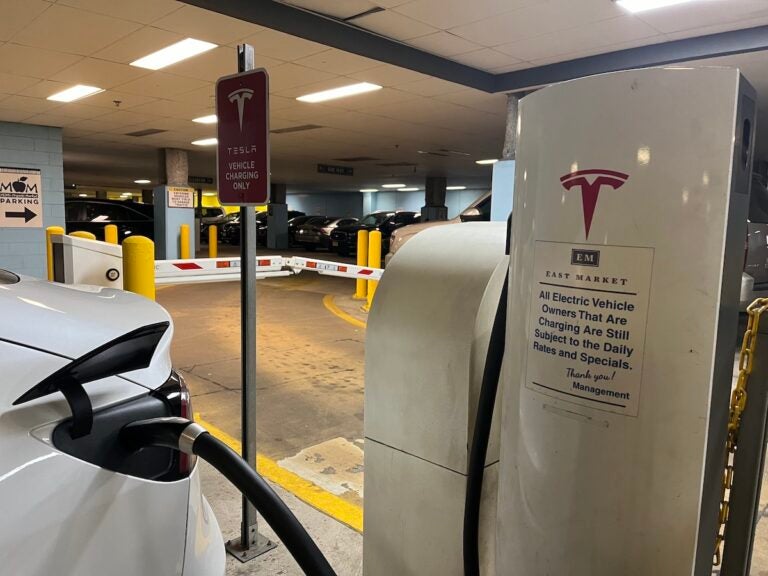
Anthony Hall oversaw a Tesla Model 3 stop by for a quick charge. (Credit: Owen Racer/WHYY)
This story is part of the WHYY News Climate Desk, bringing you news and solutions for our changing region.
From the Poconos to the Jersey Shore to the mouth of the Delaware Bay, what do you want to know about climate change? What would you like us to cover? Get in touch.
When Raphael Boateng leaves his home in West Chester for his 32-mile commute to GE HealthCare in Center City, he knows he may have to pay for both parking and to recharge his Tesla Model Y before he gets to the office.
A biomedical engineer, Boateng paid $26 to park at an Arch Street garage on a recent Friday because he would need a full battery for the upcoming weekend. He settled for a slower Level 2 charger closer to his job despite “absolutely” wishing for access to a fast-charging Level 3.
He said he tries to avoid charging in Philly altogether, but often needs to for his afternoon commute home.
“I try to save some bucks by charging where I don’t pay for parking,” he said.
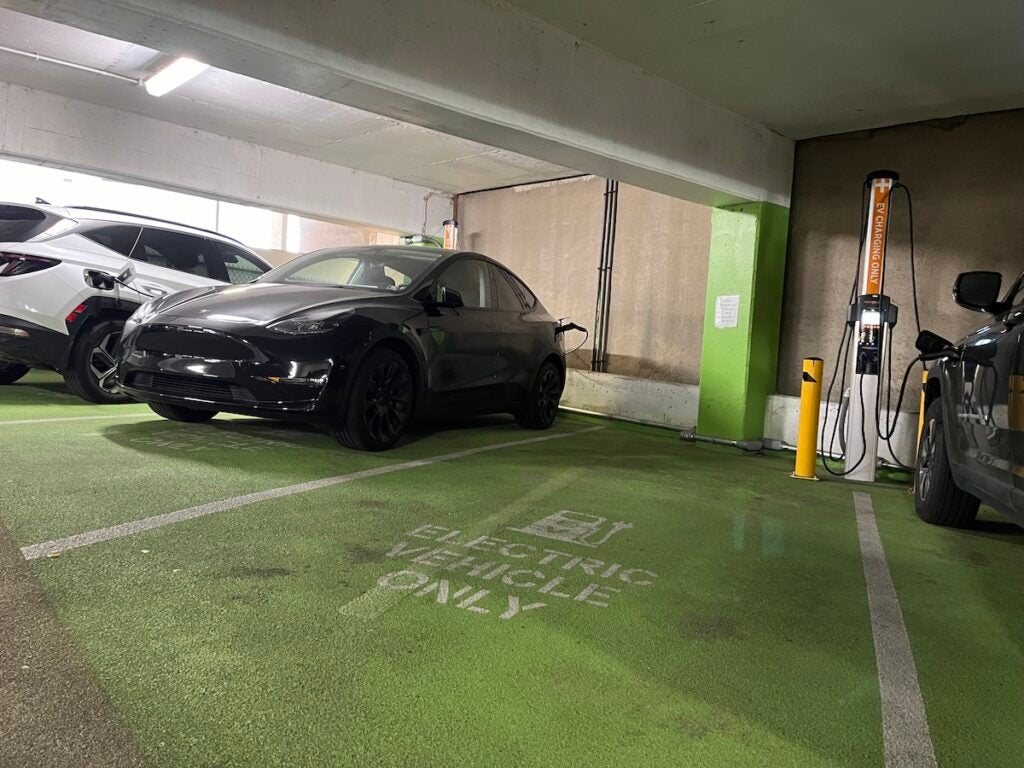
The EPA announced this week new rules that would boost production of electric vehicles in an effort to phase out gas-powered cars. The announcement is the latest effort by the Biden administration to cut climate warming emissions. Transportation remains the largest source of climate emissions and the EPA said the new tailpipe emission standards would result in cutting 7 billion tons of carbon emissions and improve air quality. It also said its analysis showed drivers will save $62 billion on fuel and maintenance costs.
But EV owners like Boateng said the charging network needs to improve, especially when it comes to the availability of fast chargers that don’t require hours of time in an expensive Center City parking garage.
EV drivers primarily have access to Level 2 charging stations, which can take six or more hours to fully recharge a car battery. Level 3 — or Direct Current Fast Charging (DCFC) stations — can recharge an EV to 80% in 30 minutes. If those are more available, electric vehicle sales could get a boost, especially among drivers worried about getting stranded without a full charge. But without an abundance of EVs on the road, private investments in chargers have stalled.
To bridge that gap the federal government stepped in with funding for EV infrastructure and fast chargers through the Bipartisan Infrastructure Law and the Inflation Reduction Act.
The assumption is more EVs on the road will drive the need for more chargers and vice versa.
“They both benefit each other, they’re complimentary, not one before the other,” said Colton Brown, the alternative fuels infrastructure coordinator for PennDOT, the agency in charge of implementing the federal funding for EV chargers in Pennsylvania.
The 2021 Bipartisan Infrastructure Law introduced a state-level program to build more Level 3 charging stations, but rollout has been slower than some drivers would like.
The National Electric Vehicle Infrastructure Formula Program (NEVI) will fund nearly $171 million for Pennsylvania charging stations through 2026. The state announced one round of vendors from the federal program with one station completed so far. Delaware and New Jersey are behind Pennsylvania, and still identifying vendors through their respective programs.
The first Pennsylvania NEVI-funded charging station came online this January in Pittston, and another is under construction. Currently, Pennsylvania has 1,449 public Level 2 and 244 DC Fast charging stations, according to the U.S. Department of Energy’s Alternative Fuels Data Center. Delaware has 188 charging stations while New Jersey has 1,244, most of which are Level 2.
Tesla, Wawa convenience stores, and Love’s, the network of national truck stops, were among the many recipients of state funding in February to install 55 fast charging station projects in 36 counties. The state plans to announce a second round in April. Federal guidelines require fast chargers be built every 50 miles on designated alternative fuel corridors, which include the interstates. Each must be within a mile from the nearest interstate exit.
Brown said PennDot’s goal is to build the fast chargers about 25 miles apart. “The rule is 50 miles, but no one would go 50 miles between gas stations,” he said.
He estimates it will take about 90 stations to fulfill the federal NEVI requirements, at which point nearly $100 million will be left over to invest in communities not reached by the main corridors. Implementation from the remaining NEVI funds will include charging stations in areas with fewer registered electric vehicles and along Route 6, which runs through rural communities in the Northern Tier of Pennsylvania.
Delaware, which is receiving nearly $3.8 million in 2024 from the NEVI program, is still negotiating the terms for their rollout and delayed announcing vendors from January to this spring, according to a spokesperson for the Delaware Department of Transportation.
New Jersey currently has 1,033 DCFC ports, according to the Alliance for Automotive Innovation.
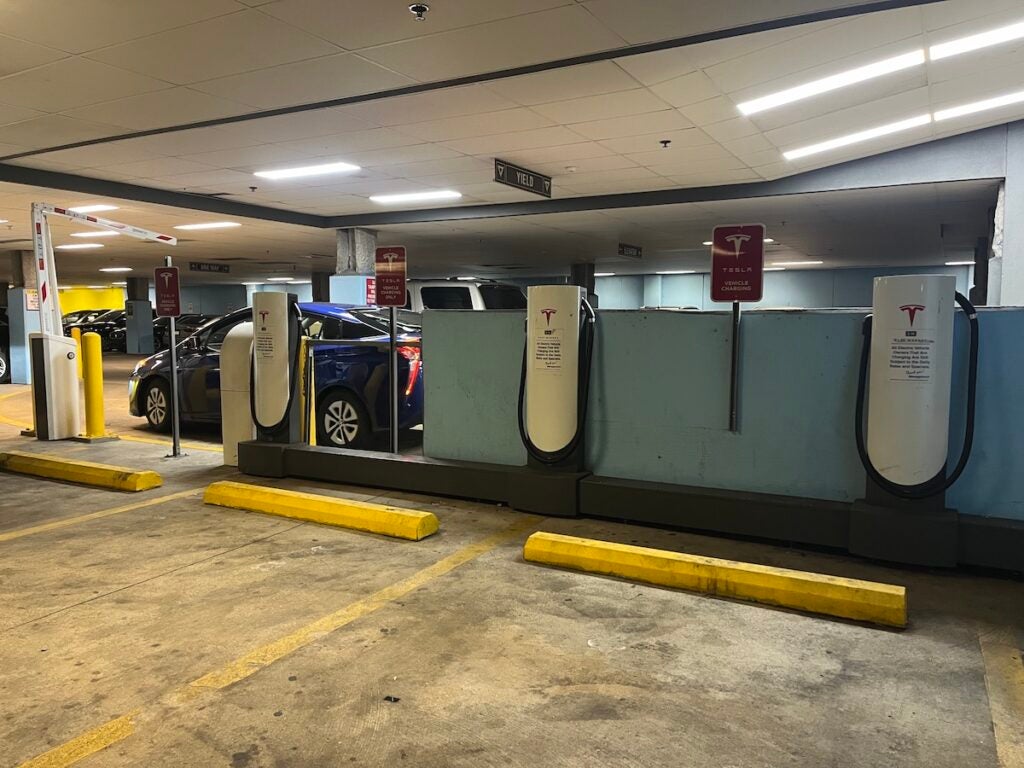
Costs and convenience of charging
Fortunately for Boateng, his workplace is near a charging station, and he can afford the garage’s parking fee. But this isn’t true for all drivers, especially considering 75% of Philadelphia’s public EV chargers require payment, including all 109 Level 3 stations.
Charging a typical electric vehicle with 300 miles of range in Pennsylvania can cost between $35 to $47 to reach a full battery, with Level 3 stations often charging higher rates than Level 2. That’s not much different than a gas-powered late-model vehicle. For example, to fill up a 2024 Toyota Camry in Pennsylvania with enough fuel to travel 300 miles would cost a driver about $41.
PennDOT says 40% of the statewide NEVI funds will benefit disadvantaged communities, in compliance with the Biden administration’s Justice40 Initiative guidelines.
For the less desired but cheaper to install Level 2 charging stations, Pennsylvania offers a rebate program of up to $5,000 for businesses to install chargers in less affluent areas that are designated as environmental justice communities.
In the meantime, it may be some time before some are convinced to make the switch from gas to electric. At a Center City garage where Tesla owners drive in and out connecting to one of eight quick Superchargers, parking attendant Anthony Hall said he has assisted several drivers who ran out of charge right before reaching the higher voltage hookup.
“When that happened, …I [said] I don’t want none, I’ll stick to the gas,” Hall said, laughing as he directed old-fashioned combustion engine vehicles past the superchargers to a regular parking spot.

Subscribe to PlanPhilly
WHYY is your source for fact-based, in-depth journalism and information. As a nonprofit organization, we rely on financial support from readers like you. Please give today.



